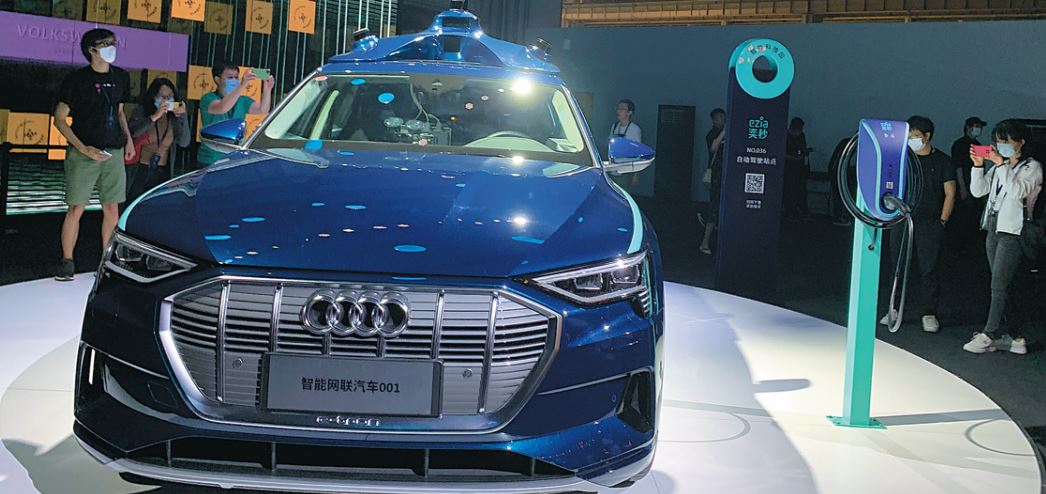Intelligent connectivity the route forward in country


Carmakers launch autonomous driving tests as technology gains wider recognition
The development of vehicle electrification in China has made progress and the next step of the vehicle revolution should focus on intelligent connectivity, industry experts said.
The auto revolution is not isolated but develops alongside progress in energy, information, other transportation and intelligent cities said Chen Qingtai, president of the industry's leading think tank China EV100. He was speaking at the third Global International Vehicle Summit held in Guangzhou, Guangdong province earlier this month.
"What we are concerned about now, the battery, ranges and charging piles, is just the prologue of the whole process. Electric vehicle technology progress should focus on two aspects. One is a foundation to ensure the good functions of electric vehicles, including battery, electric motor and control and charging infrastructure. The other is connectivity, intelligent and autonomous driving, which are also crucial to future competition," Chen said.
Cross-border integration and innovation will be key to intelligent transformation and carmakers should cooperate with internet, IT and artificial intelligence companies to rebuild the auto industry chain and ecology of intelligent vehicles, he added.
Chen Liming, president of Bosch Chassis Control Systems China, said that the company uses open-source software to integrate industry resources and develop autonomous driving technologies together.
The experts also said that China, which is developing intelligent cars, should use the advantages that vehicle-road coordination can offer.
Ran Bin, director of the intelligent connected transportation research institute of Southeast University-University of Wisconsin System, said: "We should regard roads and vehicles as a complete system and use smart roads to improve vehicle safety, reliability and related functions. Developing smart cars on a road-vehicle collaboration system can quickly achieve level 3 autonomous driving and save 50-90 percent of cost for every vehicle."
Feng Xingya, general manager of GAC, said China has the advantages of policy and market to develop a vehicle-road collaboration system. Huge market capacity, the innovation of internet business models, the professional advantages of 5G, AI and software, can promote the development of intelligent cars based on China's industry.
Surveys show that a total of 76 percent of Chinese customers think that intelligent vehicles will bring convenience to them, higher than the United States and Japan at 49 percent and 46 percent respectively.
China is ratcheting up efforts to accelerate the construction of new infrastructure that can bring a new wave of intelligent vehicle industry development.
Last year, the number of public charging piles in China was 6.7 times of the US.
Meanwhile, the number of connectivity-related 5G bases in China is 12 times more than the US, Chen Hao, vice-president of Dongfeng Motor and deputy general manager of Dongfeng Nissan, said at the summit.
Chen added that joint ventures have advantages in developing intelligent vehicles because they learn about global trends and local demands.
In 2010, Dongfeng Nissan vehicles began featuring a connectivity system and they are continuing to develop key technologies.
They launched an updated connectivity system in 2018. By July 2020, it was being equipped to all models of Nissan and Venucia, the joint venture's China-developed marque.
In the autonomous driving sector, the joint venture uses Nissan's Propilot system and has launched a 1 million kilometer road test covering special scenarios in China.
German carmaker Volkswagen launched its pilot autonomous-driving mobility service on Wednesday in Hefei, capital of East China's Anhui province.
It was also a first for Hefei, as it issued its first autonomous-driving vehicle test license to Volkswagen Group China. The license allows the auto giant to conduct road tests in September of autonomous-driving vehicles.
Haiheng community, located in Hefei Economic and Technological Development Area, will be the test site with a total area of 16 square kilometers and a road network of 80 km. Comprising universities, shopping malls, parks, hospitals, residential areas and an industrial area, the community's roads, help Volkswagen carry out autonomous driving tests aiming to optimize users' experience, according to the automaker.
It is planned that road tests with passengers will be launched in early 2021 among the 400,000 residents in the community.
The fleet used for the pilot autonomous-driving mobility service, named ezia, consists of Audi e-tron models.
According to Volkswagen, the ezia mobile application will be launched at the beginning of 2021, which will allow users to book a trial ride in the Haiheng community.
In the future, the application is expected to be an integrated platform that covers a wealth of travel service options, to meet diverse personalized needs.
Looking ahead, the auto giant has the ambition to forge an intelligent driving ecosystem, which comprises five layers: self-driving system, electric vehicles, fleet operations, mobility platform and services and content.
Weiming Soh, executive vice-president of Volkswagen Group China, said: "Digitalization, electrification and autonomous driving are the core development directions of the Volkswagen Group.
"Thanks to Volkswagen's ability to integrate technology, hardware and software, we have the capability to create an integrated travel service solution for users, that is, an ecosystem of autonomous driving services covering five layers."
By integrating the five layers of autonomous driving services, Volkswagen is determined to make travel services safer, more comfortable and efficient, according to Soh.




































